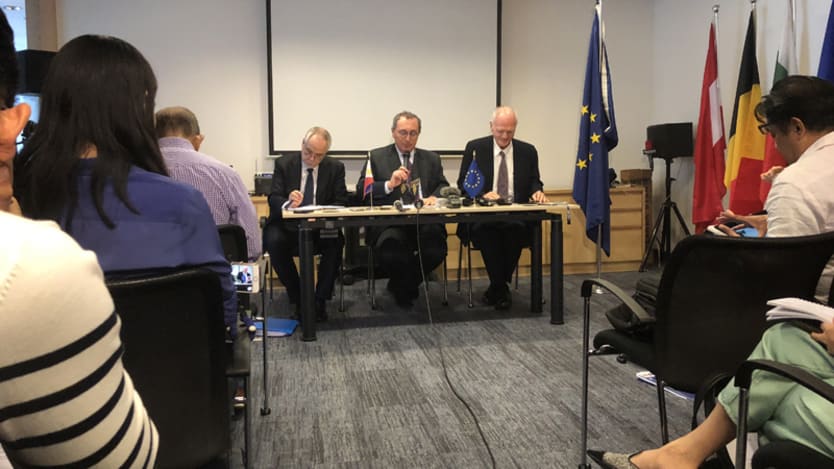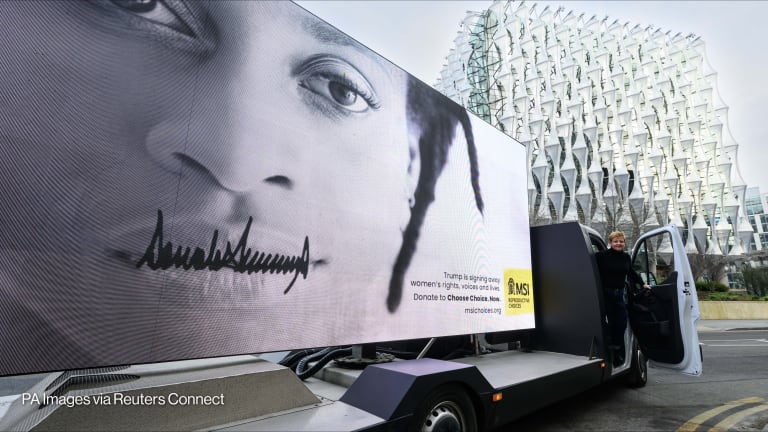
The Philippine government’s refusal to receive foreign assistance from the European Union last year left over 300 million euros ($370 million) on the table. But last week, the two parties appeared to have addressed the tension and now stand ready to continue with their development cooperation.
Ernesto Pernia, socioeconomic planning secretary of the National Economic and Development Authority of the Philippines, told reporters in an ambushed interview on Friday that EU aid in its entirety will continue in the Philippines, “more or less.”
EU aid at stake in the Philippines in the midst of a political firestorm
The Philippines has stated it will not accept foreign aid from the European Union that may interfere with internal policies, but details remain hazy. Here's what we know so far.
He declined to discuss details of the government’s closed-door meetings with the EU, although he indicated that the Philippines is back on good terms with the multilateral donor: “Well, we have good relations with the EU,” he said. “Like friends, sometimes you have misunderstandings. But most of the time you have good relations.”
The secretary was attending a technical symposium co-hosted by the EU and the Philippines’ department of energy on the feasibility of small-scale solar-powered business operations in remote, off-grid communities in the country. The symposium is part of the EU-supported Access to Sustainable Energy Program, which aims to help the Philippines meet its rural electrification targets through the use of renewable energy sources.
The event follows the activation of the EU-Philippines framework agreement on partnership and cooperation on March 1, after the ratification of the agreement by the senate in January. The agreement sets out the areas of cooperation as well as obligations between the two parties, which includes both parties’ “respect for democratic principles and human rights.”
The latest rhetoric raised a cloud of confusion regarding the Philippine government’s stance on EU foreign assistance. Last year, the EU delegation received word from members of the department of finance that the government would no longer accept EU aid grants from the multilateral donor. While no formal letter was sent to the EU delegation, several government officials have spoken about the decision, arguing that the Philippines won’t accept grants deemed to be interfering with the Philippines’ sovereignty. The Philippine government did not clearly identify which projects they were rejecting or considering for review.
In January, EU Ambassador Franz Jessen told reporters that the Philippine government rejected 6.1 million euros in trade-related technical assistance after the government returned the document unsigned. Reports surfaced that the Philippines was also considering rejecting a 39 million euro package for sustainable energy projects.
But last Friday, Stefano Manservisi, EU commission director-general for international cooperation and development, told reporters in a press conference in Makati, Philippines, that the EU has never been notified of any suspensions or rejections related to its aid.
“There is no notification to the EU of suspension or rejection whatsoever of our pending, ongoing aid linked to projects presented by the government,” he said. “So nothing is rejected.”
The director-general also clarified that the cancellation of the 6.1 million euro trade-related technical assistance was not linked to issues of human rights conditionalities. It was cancelled for budget reasons, he said.
“If you have credit [and] you cannot use [it] in a given span of time, then they are lost. This is normal life,” he said.
The EU official, who was flanked by Pierre Amilhat, EU directorate for development coordination in Asia, Central Asia, Middle East/Gulf and Pacific, and EU Ambassador Jessen, also insisted that there is “no unilateral conditionality linked to the implementation of our development assistance.” While admittedly the EU have raised concerns on human rights in the Philippines, he said that does not follow that the EU will automatically cancel its assistance in the country.
“Everything here is upon discussion. Each party can raise a problem. If each party raises a concern, each can call for measures for suspension. Both parties.”
— Stefano Manservisi, EU commission director-general for international cooperation and development“If we have a problem, we have to address it within the framework of the rules of the cooperation agreement, which now we are trying to reflect in the financing agreement, which is not finished yet as it has only been ratified,” he said.
“Everything here is upon discussion. Each party can raise a problem. If each party raises a concern, each can call for measures for suspension. Both parties. But before getting there, there are mechanisms for discussion. There is a dialogue in this,” he added. “We never had the intention ... to interfere in whatsoever.”
He admitted, however, that they are modifying the text of the EU’s financing agreement with the Philippines to ensure it aligns with the framework agreement and reflects the equal distribution of each party’s duties and rights to raise any concerns during the implementation of EU aid-supported projects.
But there is no need, he said, to repeat the contents of the framework agreement in the financing agreements.
“Now we have PCA [partnership and cooperation agreement], it’s not usual to keep mentioning everything,” he said. “Like there is a mention of human rights in PCA, it’s sufficient to say that if one or two parties does not respect the agreement in the PCA then there could be a mechanism that could lead to suspension. So PCA can regulate everything. No need to repeat everything.”
There are obligations attached to both parties under the new framework agreement.
“If either party considers that the other party has failed to fulfil any of its obligations under this agreement, it may take appropriate measures. Before doing so, except in cases of special urgency in accordance with paragraph five of this article, it shall present to the Joint Committee all the relevant information required for a thorough examination of the situation with a view to seeking a solution acceptable to the parties,” according to paragraph three of Article 53 in the document, which relates to parties’ fulfilment of obligations.
Cases of special urgency relates to a “material breach” in the agreement by one of the parties, which includes violation of two essential elements in the agreement: Respect for democratic principles and human rights, and countering the proliferation of weapons of mass destruction and their means of delivery.
The EU has not provided a time frame for the signing of the financing agreement. Manservisi hopes it “will be fast,” though additional issues around legal checks could serve to delay it.
Asked why the EU insists on providing assistance to the Philippines amid the criticisms made by Philippine President Rodrigo Duterte against the multilateral donor, Manservisi simply said that is “politics.”
“The part that the president of a partner country is criticizing the EU is politics, and among partners this is normal,” he said.
The EU has set aside 325 million euros under its current seven-year, multiannual framework of assistance to the Philippines, with a focus on renewable energy and several projects in Mindanao. They are in talks with multilateral development banks, such as the Asian Development Bank, to further increase investments for disaster management and resilience in the Philippines and the Asian region.






